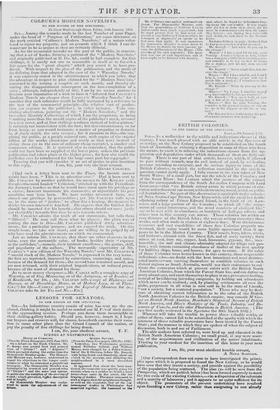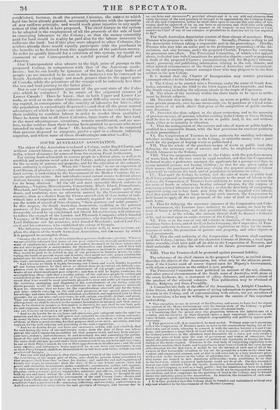BRITISH COLONIES.
TO THE EDITOR OF THE SPECTATOR.
London. Gal January 1.31.
Stn—Asa wellwisher to the middle and industrious classes t i this country, I was much pleased with an able article in the Spectator of yesterday, on the New Colony proposed to be established on the South coast of Australia, as evincing a disposition in sonic of those who have the means, to exert it in relieving the industrious classes from the op- pression and degradation under which thousands of them are daily suf- fering. There is one part of that article, however, which, if allowed to pass without remark, may do evil instead of good, by misleading persons intending to emigrate, and do serious injury to sore of the British Colonies, to which the reflection contained in the article in question cannot justly apply. I fully concur in the view taken of New South Wales ; of a small part, but not the whole of the Gelatins ; and of the Swam River : but I cannot admit the justness of the extract from the correspondence of the South Au, tralian Company with Lord Gout:awn—that " no British colony exists to which persons of edu-
cation and refinement can resortavithout incurring moral, social, or politi- cal degradation." No part of this observation is applicable to the colonies of Nova Scotia, Cape Breton, New Brunswick, and the small but fertile adjoining colony of Prince Edward Island, in the Gulf of St. Law- rence, and a large portion of the Canadas ; in which all "they enoy-
ments of social intercourse, and the usual coinforts of civilized Iiite," toe to be met with in abundance, as hundreds of half-pay officers and others now ill this country can attest. Those colonies are within au easy distance of the British Isles ; the voyag.e seldom exceeding three weeks, and often made in sixteen or eighteen days. Were the immense resources and vast capabilities of those fine Colonies properly un- derstood, their value would be more highly appreciated than it ap- pears to be in the Mother Country. Their coasts, hays, inlets, rivers, and harbours, abound with the finest fish, and of every variety; their mines of coal, iron ore, copper, lead, limestone, gypsum, tke., inex- haustible ; the soil and climate admirably adapted tor tillage and pas- ture • with forests containing abundance of timber of the best quality for building ships, boats, and houses, for ages to come. It' the value of those Colonies were better known in this country, those respectable individuals who—no doubt with the best intentions and most disinter- ested motives—are exerting themselves to establish colonic* in such distant regions as South Australia, would use their endeavours to cul- tivate the connexion which at present exists with the British North .American Colonies, from which the Parent State has, and can derive so many advantages, and exert themselves to place it on a permanent footing, instead of bewildering intending emigrants, by holding out advantages which never can be realized; and, by planting settlements all over the globe, perpetuate in all what is now said to be the state of Canada, "not a society, but a scattered population." Those who may be desi- rous of obtaining correct information as to the value of the British North American Colonies to the British empire, may consult 111. Gre- gor on British Nall: America, Bouchette's Statistical Account tf British North America, and Bliss's Statistics of the Trade, Industry, and Re- sources of Canada, and the other Plantations in British America. (The two first works reviewed in the Spectator the loth March 18320
Whoever will take the trouble to peruse those valuable works, or
either of them, cannot fail to be astonished at the apathy with which the interests of those valuable possessions have been treated by the Parent State ; and the manner in which they are spoken of when the subject of discussion, both in and out of Parliament.
The able authors here referred to, were bred up and educated in the British North American Colonies ; no small proof, if any were want- ing, of the acquirements and civilization of the native inhabitants. Trusting to your candour for the insertion of this letter in your next publication,
I am, Sir, your most obedient humble servant,
A NOVA SCOTIAN.
[Our Correspondent does not seem to have investigated the princi- ples upon which it is proposed to found the New Colony, or he would have seen that they insure a society, and provide against the possibility of the population being scattered. The plan (as will be seen from the Prospectus, which we publish below) has been formed expressly to meet the two evils of the existing Coloniea,—.viz. a dispersion of the colonists and a scarcity of labourers ; and it appears to us quite sufficient for its object. The promoters of the present undertaking have resolved upon founding a new Colony, rather than emigrating to one already established, because, in all the present Colonies, the exteat to which Land has been already granted, necessarily interferes with the operation of any uniform principle, and would work great injustice in any appli • cation of that which is here proposed. The chief feature in the system to be adopted is the employment of all the proceeds of the sale of land in conveying labourers to the Colony; so that the money ostensibly paid for land would in reality be paid also for the labour necessary to cultivate the land : but if this plan were adopted in other Colonies, the settlers already there would equally participate with the purchaser in the benefits to be derived from this application of the purchase-money. In order to qualify himself for a criticism of this system, we would re- commend to our Correspondent a careful perusal of England and America.
Our Correspondent also adverts to the high price of passage to the proposed Colony, in comparison with that of the American settle- ments : but he can hardly be ignorant of the fact, that large bodies of people (as are intended to be sent in this instance) can be conveyed to South Australia at a charge not much greater than to the opper parts of Canada, while the privations of the voyage will be infinitely less than the sea and land journey to the latter place. But is our Correspondent ignorant of the present state of the Colo- nies which he eulogizes? Is lie aware of the seignorial tenures of Lower Canada? Does he know, that in both Upper and Lower Ca- nada, as well as in the other Colonies, great diffpulty exists in employ- ing capital, in consequence of the scarcity of labourers for hire ?—that the population is exceedingly dispersed ?—and that all the great natural advantages of which he speaks are utterly useless to the colonists, from their inability to combine labour in order to render them available ? Does he know that in all these Colonies, large tracts of the best hind, in the most advantageous situations, remain uncultivated, and are use- less, to the settlers from their having been granted to persons who never intended to make use of them ? Or, knowing this, can he be surprised that persons disposed to emigrate, prefer a spot in a climate infinitely superior, and where none of these disadvantages can arise ?-111).]























 Previous page
Previous page